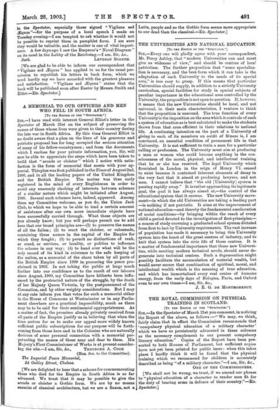A MEMORIAL TO OUR OFFICERS AND MEN WHO FELL IN
SOUTH AFRICA.
[To THE EDITOR OP THY "SPECTATOR."]
Sra,—I have read with interest General Elliot's letter in the Spectator of March 21st on the subject of preserving the ,names of those whose lives were given to their country during the late war in South Africa.. By this time General Elliot is no doubt aware that a plan on the lines of his generous and patriotic proposal has for long occupied the serious attention of many of his fellow-countrymen ; and from the documents which I enclose for your private information, you, Sir, will now be able to appreciate the steps which have been taken to build that " arcade or cloister " which I notice with satis- faction is the form of memorial that meets with your ap- proval. This plan was first published in the Times of August2nd, 1900, and in all the leading papers of the United Kingdom and the British Empire. The matter was thus early registered in the mind of every Englishman in order to avoid any unseemly clashing of interests between schemes of a similar nature which might be initiated after August, 1900. Several such schemes have, indeed, appeared. Among them my Committee welcome, as you do, the Union Jack Club, to which we hope to be able to lend a certain amount of assistance after our own more immediate objects have been successfully carried through. What these objects are you already know; but you will perhaps permit me to add here that our broad principles are—(1) to preserve the names of all the fallen; (2) to erect the cloister, or colonnade, containing these names in the capital of the Empire for which they fought; (3) to permit no distinctions of rank, or creed, or services, or locality, or politics to influence the scheme in any way; (4) to band over what will be the only record of its kind in existence to the safe keeping of the nation, as a memorial of the share taken by all parts of the British Empire since 1899 in procuring the peace pro- claimed in 1902. In not taking the public at large 'much further into our confidence as to the result of our labours since August, 1900, my Committee have hitherto been influ- enced by the protracted nature of the struggle, by the death of her Majesty Queen Victoria, by the postponement of the Coronation, and by other weighty considerations. But I may at any rate inform you that votes for such a memorial either in the House of Commons at Westminster or in any Parlia- ment elsewhere are a practical impossibility, much as there may be to be said for their sentimental appropriateness. As a matter of fact, the promises already privately received from all parts of the Empire justify us in believing that when the time arrives for us to make our appeal more widely known sufficient public subscriptions for our purpose will be forth- coming from those here and in the Colonies who are naturally desirous of some personal connection with a memorial per- petuating the names of those near and dear to them. His Majesty's First Commissioner of Works is at present consider- 64 Oakley Street, Chelsea.
[We are delighted to hear that a scheme for commemorating those who died for the Empire in South Africa is so far advanced. We trust that it may be possible to give the arcade or cloister a Gothic form. We are by no means enemies of classical architecture, but we are a Saxon, not a, Latin, people and so the Gothic form seems more appropriate to our dead than the clasaical,—En. Spectator.]










































 Previous page
Previous page